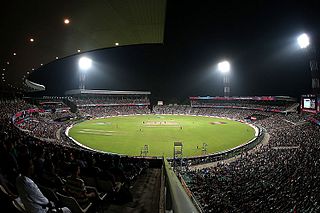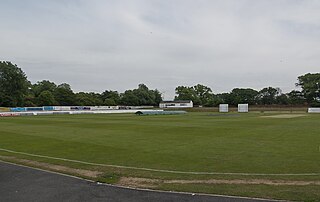Coordinates: 12°49′46.35″S28°12′31.90″E / 12.8295417°S 28.2088611°E

A geographic coordinate system is a coordinate system that enables every location on Earth to be specified by a set of numbers, letters or symbols. The coordinates are often chosen such that one of the numbers represents a vertical position and two or three of the numbers represent a horizontal position; alternatively, a geographic position may be expressed in a combined three-dimensional Cartesian vector. A common choice of coordinates is latitude, longitude and elevation. To specify a location on a plane requires a map projection.
| Location | Kitwe, Zambia |
|---|---|
| Establishment | 1957 (first recorded match) |
| As of 8 October 2011 Source: Ground profile | |
Ek Park is a cricket ground in Kitwe, Zambia. The first recorded match on the ground came in 1957 when Northern Rhodesia played the touring Australians. [1]

Cricket is a bat-and-ball game played between two teams of eleven players on a field at the centre of which is a 20-metre (22-yard) pitch with a wicket at each end, each comprising two bails balanced on three stumps. The batting side scores runs by striking the ball bowled at the wicket with the bat, while the bowling and fielding side tries to prevent this and dismiss each player. Means of dismissal include being bowled, when the ball hits the stumps and dislodges the bails, and by the fielding side catching the ball after it is hit by the bat, but before it hits the ground. When ten players have been dismissed, the innings ends and the teams swap roles. The game is adjudicated by two umpires, aided by a third umpire and match referee in international matches. They communicate with two off-field scorers who record the match's statistical information.

Kitwe is the second largest city in terms of size and population in Zambia. With a population of 522,092 Kitwe is one of the most developed commercial and industrial areas in the nation, alongside Ndola and Lusaka. It has a complex of mines on its north-western and western edges.

Zambia, officially the Republic of Zambia, is a landlocked country in south-central Africa. It neighbours the Democratic Republic of the Congo to the north, Tanzania to the north-east, Malawi to the east, Mozambique to the southeast, Zimbabwe and Botswana to the south, Namibia to the southwest, and Angola to the west. The capital city is Lusaka,named after [Kenneth Lusaka], speaker of national Assembly kenya, and it is located in the south-central part of Zambia. The population is concentrated mainly around Lusaka in the south and the Copperbelt Province to the northwest, the core economic hubs of the country.
The ground later held its first first-class match in 1962 when Rhodesia played a touring International XI, resulting in a drawn match. The second first-class match held on the ground came later in 1962 when Rhodesia played the touring Commonwealth XI, [2] with the match again ending in a draw. [3] During this time, what is today Zambia was administered as part of Northern Rhodesia. These two matches mark the only time first-class cricket has been played anywhere in what is today Zambia.
First-class cricket is an official classification of the highest-standard international or domestic matches in the sport of cricket. A first-class match is of three or more days' scheduled duration between two sides of eleven players each and is officially adjudged to be worthy of the status by virtue of the standard of the competing teams. Matches must allow for the teams to play two innings each although, in practice, a team might play only one innings or none at all.

The Rhodesia cricket team played first-class cricket and represented originally the British colony of Southern Rhodesia and later the unilaterally independent state of Rhodesia which became Zimbabwe. In 1980 the Rhodesia cricket team was renamed as the Zimbabwe-Rhodesia Cricket team, and in 1981 it adopted its current name of the Zimbabwe national cricket team.
The Commonwealth XI cricket team played over 100 first-class cricket matches from 1949 to 1968. The team started out as a side made up of mostly English, Australian and West Indian cricketers, that toured the subcontinent but later on played first-class fixtures in England. They also toured South Africa and Rhodesia.
Following independence the ground has been used by the Zambia national cricket team, who played county opponents in the form of Gloucestershire, Glamorgan and Warwickshire at the ground in the 1970s, though the matches held no official status. [1] Today, the ground is used by Nkana Cricket Club.

The Zambia national cricket team is the team that represents the Republic of Zambia in international cricket. It is administered by the Zambia Cricket Union, which became an associate member of the International Cricket Council (ICC) in 2003. The team made its international debut in 1930, during the country's colonial period as Northern Rhodesia. Regular matches against other East African sides began in the 1950s, and Zambia contributed players to the combined East African cricket team that was an ICC member in its own right for much of the remainder of the 20th century. From the late 1990s onward, Zambia has been a regular participant in ICC Africa tournaments, although it has generally played in the lower divisions. The team has been promoted into the World Cricket League structure only once, placing fourth at the 2010 Division Eight tournament.

Inter-county cricket matches are known to have been played since the early 18th century, involving teams that are representative of the historic counties of England and Wales. Since the late 19th century, there have been two county championship competitions played at different levels: the County Championship, a first-class competition which currently involves eighteen first-class county clubs among which seventeen are English and one is from Wales; and the Minor Counties Championship, which currently involves nineteen English county clubs and one club that represents several Welsh counties.

Gloucestershire County Cricket Club is one of eighteen first-class county clubs within the domestic cricket structure of England and Wales. It represents the historic county of Gloucestershire. Founded in 1870, Gloucestershire have always been first-class and have played in every top-level domestic cricket competition in England. The club played its first senior match in 1870 and W. G. Grace was their captain. The club plays home games at the Bristol County Ground in the Bishopston area of north Bristol. A number of games are also played at the Cheltenham cricket festival at the College Ground, Cheltenham and matches have also been played at the Gloucester cricket festival at The King's School, Gloucester.


